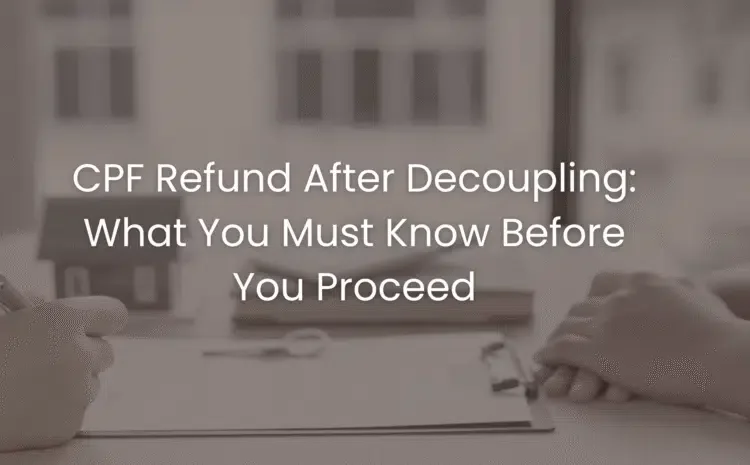CPF Refund After Decoupling: What You Must Know Before You Proceed
When decoupling property in Singapore, a CPF refund is often required—but many homeowners aren’t aware of what this means until they’re deep into the legal process. If you’ve used CPF savings to fund your home purchase, you must return the amount withdrawn—plus accrued interest—when transferring your share to the other co-owner.
Understanding how CPF refunds work is critical. If you fail to account for this early on, you could face delays, cash flow issues, or legal complications that affect your next property move.
Let’s break it all down so you can plan with clarity.
What Is a CPF Refund and When Is It Required?
In Singapore, when you use funds from your CPF Ordinary Account (OA) to pay for your home—whether for the down payment, legal fees, or monthly installments—you’re effectively taking a loan from your own retirement savings.
When you sell your share of the property (as you would in a decoupling arrangement), the law requires you to refund that amount into your CPF OA, including the interest that would have accrued if the money had remained in your CPF account.
You must refund:
The principal CPF amount used
Accrued interest (currently 2.5% p.a. compounded)
Let’s say you used $100,000 of your CPF OA to purchase your home. You’re now transferring your share to your spouse via decoupling.
If it’s been 5 years, you’ll likely need to refund around $113,000 or more (depending on the time and interest accrued).
This refund must go back into your CPF before you can use CPF again for future purchases.
Why Is CPF Refund Required During Decoupling?
Because decoupling is structured like a legal sale between co-owners—even if you’re married—the sale proceeds are treated just like a normal property transaction.
This triggers the CPF refund rule, which ensures that:
The CPF Board is repaid for what was used
Your CPF savings are replenished for retirement or future property use
For more on the decoupling process itself, read our full article on Decoupling Property in Singapore.
What Happens If You Don’t Have Enough Cash to Refund?
This is where many decoupling plans fall apart.
If the proceeds from your share sale (after legal fees, stamp duties, etc.) are not enough to cover the required CPF refund, the transaction may not go through unless you top up the shortfall in cash.
In some cases, CPF may waive the shortfall refund—but only if:
The property is sold at market value
There’s no undervaluation or cash-back arrangement
However, waivers are not guaranteed. You’ll need to write in and provide justifications.
How a CPF Refund Affects Your Future Property Plans
After refunding CPF:
The refunded amount goes back into your CPF OA.
You can reuse these funds for future property purchases (e.g. down payment, legal fees, monthly loans).
But keep in mind: CPF usage limits apply if the new property is under a lease of less than 60 years or exceeds the Valuation Limit.
If you’re planning to invest in a second property, our Property & Finance Law team can help assess CPF readiness, financing eligibility, and legal documents needed.
CPF Terms Explained
Here’s a quick glossary to help:
CPF OA (Ordinary Account): The portion of CPF used for housing, insurance, and education.
Accrued Interest: The interest you would have earned if CPF funds hadn’t been withdrawn. Currently 2.5% per year.
Valuation Limit: The maximum amount of CPF you can use for a property—typically the lower of purchase price or property value at time of purchase.
Waiver of Shortfall: CPF Board may allow you to waive the remaining refund if your sale proceeds are insufficient, and the property was sold fairly.
Final Considerations Before You Decouple
CPF refunds aren’t just a technicality—they impact your:
Cash flow
CPF usability for your next home
Loan eligibility
Retirement planning
You should also consider aligning your estate planning documents such as Wills, Letters of Administration, and LPA to reflect new ownership status after decoupling.
Talk to a Lawyer Before Decoupling or Triggering a CPF Refund
Before you proceed, speak to a lawyer who understands both CPF regulations and the legal side of property ownership.
Call or WhatsApp us at +65 8780 2499
Message us on Instagram:@yylee_familylaw
Frequently Asked Questions
-
It’s the process of returning the CPF funds used for property purchase—plus accrued interest—when one party sells their share in a property.
-
Yes, unless your sale proceeds fall short and CPF grants a waiver. However, it’s best to plan for a full refund to avoid delays.
-
Yes. Once refunded, you can reuse it for your next property—subject to CPF housing usage rules and limits.

